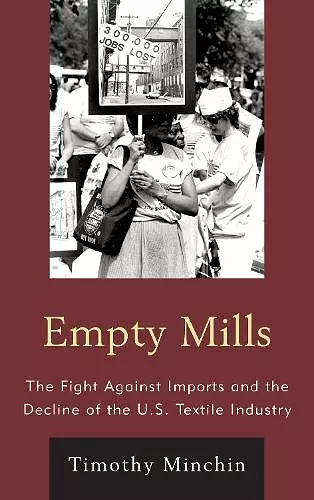Empty Mills
The Fight Against Imports and the Decline of the U.S. Textile Industry
Format:Hardback
Publisher:Bloomsbury Publishing PLC
Published:19th Dec '12
Currently unavailable, and unfortunately no date known when it will be back

With the economy struggling, there has been much discussion about the effects of deindustrialization on American manufacturing. While the steel and auto industries have taken up most of the spotlight, the textile and apparel industries have been profoundly affected. In Empty Mills, Timothy Minchin provides the first book length study of how both industries have suffered since WWII and the unwavering efforts of industry supporters to prevent that decline. In 1985, the textile industry accounted for one in eight manufacturing jobs, and unlike the steel and auto industries, more than fifty percent of the workforce was women or minorities. In the last four decades over two million jobs have been lost in the textile and apparel industries alone as more and more of the manufacturing moves overseas. Impeccably well researched, providing information on both the history and current trends, Empty Mills will be of importance to anyone interested in economics, labor, the social historical, as well as the economic significance of the decline of one of America’s biggest industries.
Historian Minchin (La Trobe Univ., Australia) provides a thoroughly documented study about one of the lesser-known and most disastrous stories of America's deindustrialization--the decline and fall of the textile industry. Textile manufacturing was the nation's first industry, early in New England and later in the South, employing many thousands of people, mostly in small cities. Because of this, small cities were devastated when a mill closed. Little attention was given in the media to the mill closings in small cities, as opposed to the wide media coverage of layoffs in large cities like Detroit and Pittsburgh. In addition to these mills' being the major employer in a small city, a great proportion of the workers were women and blacks. Minchin also reports on the unsuccessful efforts to save the industry through union compromises and employer organization, to no avail. The effects of imports, trade deals such as NAFTA, and automation are discussed in detail. The book concludes with two microeconomic studies, one in the North and one in the South, of cities that were devastated and their efforts to recover. Abundant footnotes; exhaustive bibliography. Summing Up: Recommended. * Choice Reviews *
Minchin makes a convincing case. His research is thorough, combining oral history interviews with research in the papers of textile-state politicians, newspaper accounts, and a substantial peek into the secondary literature of the field. The book provides well-footnoted support for the conventional wisdom, familiar to most residents of the textile South, of the negative impact of deindustrialization on communal and personal levels. Minchin tells his story with clarity and a certain verve. ... Minchin writes with clarity, and his research is solid. It provides a valuable addition and source of information about Washington, D.C.’s wrangling with the imports and a working depiction of the functions of deindustrialization. The book is useful for scholars of American deindustrialization in the post– World War II South. For graduate seminars it should provide a very good tool for discussions about methodology and the mentality of historians’ tasks. * Journal of American History *
Competition from low-priced imports has been a major cause of job losses and plant closures in American manufacturing since the 1960s. Alfred E. Eckes, Jr., Judith Stein, Dana Frank, and other authors have profitably explored the impact of imports. Still, the subject has not received the attention it deserves within the expanding historical literature on deindustrialization. Timothy J. Minchin’s highly worthwhile Empty Mills helps fill the gap. ... Empty Mills is lucidly written. . . . The volume is based on comprehensive research, including multiple interviews conducted by the author. Numerous passages about and in the words of the industries’ employees and backers poignantly capture the plight of displaced operatives and shuttered mill towns. Sections of the book would work well with undergraduates. 'Protectionism' is practically a dirty word in educated society today across the spectrum from left to right. Empty Mills presents a convincing argument that the nation’s commitment to free trade should be comprehensively rethought. * American Historical Review *
Empty Mills demonstrates the devastating impact of the demise of the U.S. textile and garment industries on workers and communities and tells the story of the curious cross-class campaigns that tried–and ultimately failed–to preserve U.S. jobs using import controls. This is a tragic cautionary tale for working people and unions in the neoliberal era. -- Nancy MacLean, Duke University, author of Freedom Is Not Enough: The Opening of the American Workplace
ISBN: 9781442220829
Dimensions: 237mm x 161mm x 29mm
Weight: 649g
352 pages